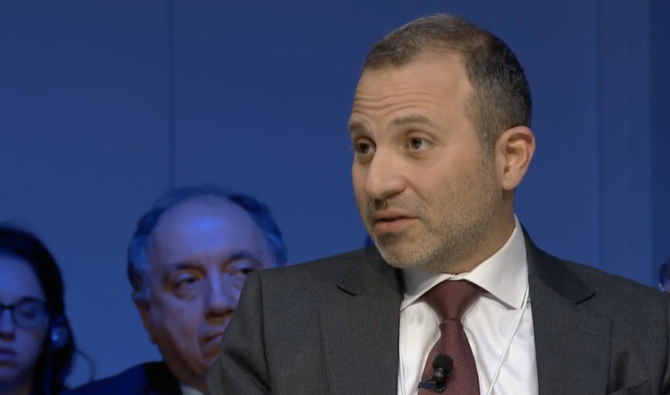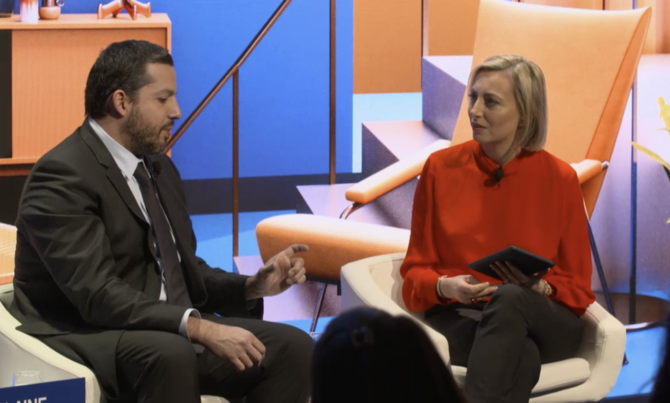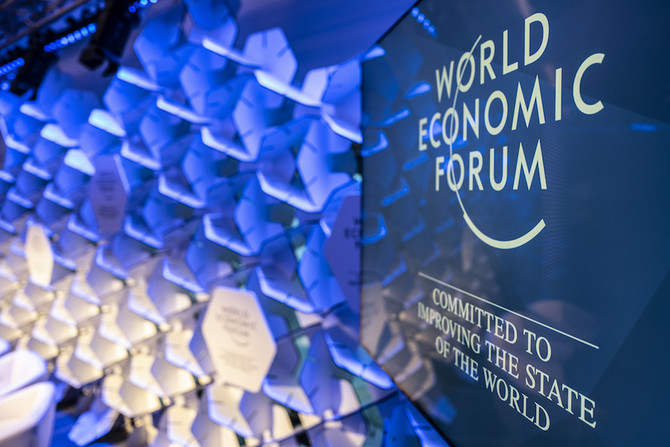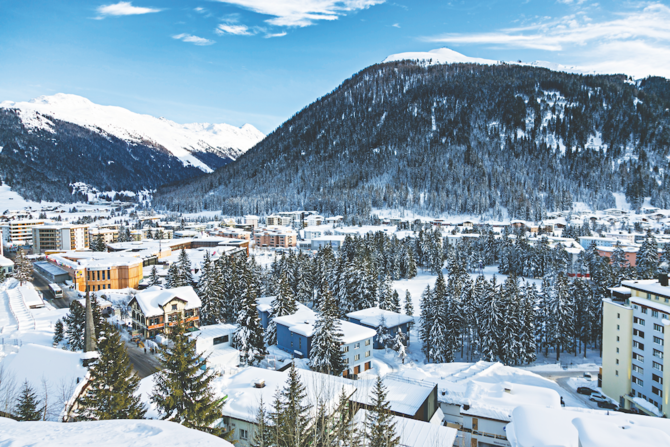DAVOS: More than 3,000 political, business and civil leaders have descended upon Davos in Switzerland for the World Economic Forum Annual Meeting on Tuesday. Follow Arab News' live coverage below.
------
17:55 - That's a wrap on the Middle East Strategic Outlook panel and Tuesday's action, with some interesting points made by the Saudi Arabian, Emirati and Bahraini panelists - you can catch up with the whole session below:
17:45 - Mohammad Al-Tuwaijri on the journeys undertaken by both Dubai, the UAE and also Saudi Arabia in developing their economies...
#LIVE: @wef #SaudiArabia's Mohammad Al-Tuwaijri: #Dubai started their journey in 1980s - since then, have been so many bad events in #MiddleEast - but they are still growing and showing the world what they can do. "They have done a great job" #WEF19https://t.co/aQGzolMuHG pic.twitter.com/7o2HbSbyUS
— Arab News (@arabnews) January 22, 2019
#LIVE: @wef #SaudiArabia's Mohammad Al-Tuwaijri: #Vision2030 in Saudi Arabia, we have created new sectors for local talent, and its is a huge business opportunity #WEF19 #Davos19https://t.co/aQGzolMuHG pic.twitter.com/FdJwuQ4QEQ
— Arab News (@arabnews) January 22, 2019
17:30 - Alain Bejjani of Majid Al-Futtaim says that Saudi Arabia's Vision 2030 has "set a vision and plan" for other countries to follow...
#LIVE - Alain Bejjani: #SaudiArabia's #Vision2030 has directly for the Kingdom and indirectly for other countries in the region "set a vision and plan" for others to reach or follow suit (@wef) #WEF19 #Davos19https://t.co/aQGzolMuHG pic.twitter.com/ilvCNa5MTm
— Arab News (@arabnews) January 22, 2019
17:15 - Strong words from Khalid Al-Rumaihi, CEO of Bahrain Economic Development Board...
#LIVE: #MiddleEast Outlook - Khalid Al-Rumaihi CEO #Bahrain Economic Development Board: "I think Arab world has missed first three #IndustrialRevolutions, we must make sure we grab the fourth one. Investment - like that done in #SaudiArabia - is key"https://t.co/aQGzoluTj6 pic.twitter.com/o09nVYIcvJ
— Arab News (@arabnews) January 22, 2019
While Saudi Arabia's Mohammad Al-Tuwaijri has praised the shift in ideas and investment into renewable energies as "significant," despite the GCC still being reliant on oil.
#LIVE: @wef #SaudiArabia's Mohammad Al-Tuwaijri: #GCC still highly relies on #oil, but the shift and investment in #RenewableEnergy has been significant. #WEF19 #Davos2019https://t.co/aQGzolMuHG pic.twitter.com/ZSaEs6pOWn
— Arab News (@arabnews) January 22, 2019
16:45 - Coming up next is an important one for our region - an outlook on the Middle East. The panel includes Saudi Arabia's Minister of Economy and Planning Mohammad Al-Tuwaijri, Youssef Chahed, Tunisia PM and Rami Hamdallah PM of the Palestinian National Authority. Also there will be Mirek Dusek, senior WEF director, who spoke to Arab News on the eve of the summit to reveal what will be on the agenda. The panel will be chaired by Hadley Gamble, reporter and anchor, CNBC.
16:15 - Remember David Blaine? As a bit of respite, Davos attendees are being treated to a talk by the magician, illusionist and "endurance artist" on how "awe can shift perception and turn skeptics into believers..."

15:45 - Wondering what the latest Saudi Arabian lines from Davos are? Of course you are. According to the chief of the International Energy Agency (IEA), the Kingdom will remain the largest global oil exporter for years to come despite the growth of the US oil sector, Fatih Birol told the World Economic Forum.
READ MORE: Saudi Arabia to remain oil exporting kingpin says IEA boss
-------
15:20 - Pompeo shares his thoughts on Yemen and the Middle East as a whole, and what role the US is looking to play...
#LIVE: #Pompeo at #WEF19 on #MiddleEast - #US is committed to Middle East stability, but will need "coalitions to be built", threat from #Iran in the region is "very real" #Davos2019 (@wef) pic.twitter.com/n2cRhBqOJ8
— Arab News (@arabnews) January 22, 2019
#LIVE: #Pompeo on #Yemen - Very hopeful of a solution to the crisis, #Houthis broke agreement on Jan. 10 using #Iranian weapon of war - we are committed to working with #UN envoy Griffiths on finding a solution (@wef) #Davos2019https://t.co/aQGzolMuHG pic.twitter.com/hRMcRIpoLz
— Arab News (@arabnews) January 22, 2019
15:10 - Pompeo praises what he calls "beautiful coalitions" with countries in challenging the threat of North Korea and checking China's expansionism as well as countering terrorism and Iran's "foreign adventurism," but reiterates that there is still a lot of work for the US and the world to do - together...
15:00 - US Secretary of State Mike Pompeo joins WEF19 in Davos - albeit via video-link...
14:45 - Bolsonaro makes some bold claims about what he envisages his government doing to help Brazil and its economy - saying he will “actively support” reform of the WTO, will fight corruption and organised crime and with the help of global partners with technological knowledge tap into Brazil’s “abundant mineral riches” to “develop resources.”
Klaus Schwab says the world looks forward to seeing the progress he makes…
14:30 - Brazilian president Jair Bolsonaro says he is "moved and honored" to be addressing the crowd at Davos...
#LIVE: #Bolsonaro tells @wef that he plans to attract heavy foreign investment to ensure public security and to encourage tourism to an otherwise "undiscovered" destination - "we stand with open arms" #WEF19 #Davos2019https://t.co/aQGzolMuHG pic.twitter.com/GSmwAwWVYv
— Arab News (@arabnews) January 22, 2019
14:15 - As attendees start to file back in after a quick bite for lunch, we are looking ahead to addresses by Brazil's new president Jair Bolsonaro and US Secretary of State Mike Pompeo in the afternoon session here in Davos - how will Bolsnaro's populist approach go down with the globalist attendees at WEF? Stay tuned to find out...
13:35 - Prince William asks Sir David about how technology is being used to further explore the natural world. Attenborough emphasized humans’ responsibility toward the natural world. “We are only too well aware that the whole of the natural world is at our disposal … We can do things accidentally that exterminate a whole area of the natural world and the species that live within in,” he said.

13:25 - Prince William, Duke of Cambridge is interviewing broadcaster and natural historian Sir David Attenborough on the Davos stage now, watch a live stream above...
#LIVE: Prince William, Duke of Cambridge, interviews broadcaster and natural historian Sir David Attenborough at #wef19 #Davos19 https://t.co/aQGzolMuHG pic.twitter.com/q6mxOCEK2l
— Arab News (@arabnews) January 22, 2019
-------
If you want to follow World Economic Forum panels specifically about the Middle East, check out our handy guide here
-------
13:10 - The "Belt and Road - China's Trillion-Dollar Vision" panel is currently going on - and it comes after a top financial regulator in China said on Tuesday it’s “certain” that the Chinese economy will slow further this year — but that’s largely due to a “much-needed” cooling of the real estate market. Speaking at Davos, Fang Xinghai, vice-chairman of the China Securities Regulatory Commission, said the slowdown from last year’s 28-year low rate of 6.6 percent to around 6 percent is not a “collapse.” That remains to be seen...
And the panel has been discussing the pros and cons of free trade - a topic the British are clearly sending a tongue-in-cheek message to Davos about this week, as discovered by our roving reporter Frank Kane...
Brexit message to @davos @wef in Belvedere pic.twitter.com/gOYsOfgYSv
— frank kane (@frankkanedubai) January 22, 2019
13:00 - Coming up shortly, Prince William, Duke of Cambridge will be interviewing conservationist and broadcaster Sir David Attenborough - and the latter has already come out with one of the "quotes of Davos"...
Quote of the Day from David Attenborough, naturalist and broadcaster.
Read his full speech from the Crystal Awards at Davos 2019: https://t.co/Z5Rmx2R0HE #wef19 #nature pic.twitter.com/feT1mY5w3c
— World Economic Forum (@wef) January 22, 2019
-------
Arab News is covering WEF19 in depth, and you can read all of our coverage from the World Economic Forum by visiting our Davos 2019 spotlight
-------
12:50 - David Miliband speaks about the growing global problem of refugees and displaced peoples, he briefly mentions Yemen and his hope that peace talks between the two parties operating in the country will offer a solution to the humanitarian needs of the country.
12:30 - Our next panel is The Humanitarian Crises That Will Shape 2019 - the panel includes: David Miliband, president of International Rescue Committee and Heba Aly who is director of IRIN - who starts the discussion about climate change affecting millions of lives and the "fragile states" being some of the biggest humanitarian crises the world needs to be working to solve...

------
12:20 - Up later: Brazil's far-right President Jair Bolsonaro is set to address Davos as the first main headline act of the day. It will be interesting to hear Bolsonaro’s pitch to the “global elite” gathered at the World Economic Forum. Bolsonaro surfed a populist wave to ride to power (sound familiar?) — and seems to be everything the so-called “Davos Man” is not. Still, as with Donald Trump’s appearance at the World Economic Forum a year ago, Bolsonaro’s attendance emphasizes the big global shift toward populism, whether the Davos Man likes it or not.
READ MORE: Brazil’s nationalist leader to address Davos globalist crowd

------
12:10 - The terrifying threat of climate change is one of the most important items on the agenda at Davos this year. And many of the panelists would have doubtlessly perfected their speeches on, er, their private jets on the way over. According to the Air Charter Service, a record number of private jet flights — nearly 1,500 — are forecast to travel to airports near Davos in the Swiss Alps over the week of the World Economic Forum (WEF). That would be up from the more than 1,300 aircraft movements seen at last year’s forum. So for the “Davos elite,” the environment is clearly very important — especially when it comes to putting your feet up on the plane …
READ MORE: Never mind climate change, Davos prefers private jets
------
12:00 - Arab News reporter Anna Pukas will be speaking with Young Photographer of the Year 2018 Skye Meaker at the World Economic Forum, who is taking part in a panel with Jane Goodall this afternoon - take a look at some of his beautiful wildlife images here. And to brighten your Tuesday afternoon amid all the serious stuff, here is his stunning winning photo below...

Skye Meaker, Young Photographer of the Year 2018 - winning image
11:50 - Gebran Bassil says that the Lebanese model of coexistence is "still holding," despite examples of it not working elsewhere around the world, and that while a stable Syria is the target of Lebanon, spreading the Lebanese model to the rest of the region "is not easy."
11:20 - Gebran Bassil, Lebanese foreign minister says democracy in his country has reached a level of "reconciliation" despite decades of conflict converging on Lebanon, which has often acted as a "bumper" during these regional clashes, and wider conflicts.

11:00 - Our next panel - Peace and Reconciliation in a Multipolar World - has started, and the panel includes: Gebran Bassil, Ministry of Foreign Affairs Lebanon, Abdullah Abdullah of the Afghanistan government and Abdelkader Messahel, Minister of Foreign Affairs in Algeria. Follow it live here:
#LIVE: #WEF19 Next panel - Peace and Reconciliation in a Multipolar World - has started, w/ Gebran Bassil, Ministry of Foreign Affairs #Lebanon, Abdullah Abdullah of #Afghanistan and Abdelkader Messahel, Minister of Foreign Affairs #Algeria. Follow live: https://t.co/aQGzolMuHG pic.twitter.com/qPSFtimDhJ
— Arab News (@arabnews) January 22, 2019
10:50 - Satya Nadella, chief executive officer of Microsoft, is adding his thoughts on how young people can shape the future of society - he acknowledges the problems the young panellists raised, and acknowledges the challenges require new approaches to solve them. He says: "Young people have shown us in constrained environments what can be achieved, your ingenuity and that you did not accept the status quo."
10:40 - We are now hearing an emotional appeal and inspiring life story being shared by refugee Mohammed Hassan Mohamud, who lives in - and is Zonal Chairman of - Kakuma refugee camp in Kenya. Powerful stuff.

From a refugee camp to Davos: one Co-Chair’s story https://t.co/fXTiiJwX8r #GlobalShapers #wef19 pic.twitter.com/DrpkIyVtvC
— World Economic Forum (@wef) January 22, 2019
10:25 - The first panel - Shaping Globalization 4.0 - has begun featuring young voices from a range of sectors, with Basima Abdulrahman, founder and Chief Executive Officer of KESK Green Building Consulting, Iraq's first green building company kicking us off...
10:15 - In his opening remarks, Professor Schwab hints at the "Globalization 4.0" theme of the forum by saying: “Globalization has to be human-centered, it has to be more inclusive, it has to be much more sustainable.”

10:00 - The "Welcoming Remarks" and a special address are just getting started, with the founder and executive chairman of WEF Klaus Schwab and Ueli Maurer, president of the Swiss Confederation and Federal Councillor of Finance kicking us off...
The welcoming remarks were opened with a lovely tune played by some alpine horn players - WEF19 is well and truly up and running...
Alpine horns. This is what @Davos @wef is all about... pic.twitter.com/tpnQs5WtEq
— frank kane (@frankkanedubai) January 22, 2019
09:55 - Monday saw Saudi Arabian filmmaker Haifaa Al-Mansour awarded at the 25th Crystal Awards, along with conductor Marin Alsop and broadcaster Sir David Attenborough.
#LIVE: Our next winner at the Crystal Awards at @wef #Davos2019 is #SaudiArabia's first female filmmaker Haifaa Al-Mansour (@HaifaaMansour) #WEF19 who has been recognized for her leadership in cultural transformation in the #Arab worldhttps://t.co/y8CTlGX8Pd pic.twitter.com/AHkxTmMiBg
— Arab News (@arabnews) January 21, 2019
09:45 - We have quite a packed agenda for Tuesday, with panels on globalization, the environment and strategic outlooks for the Middle East all coming up today. Stay tuned for more details.







































